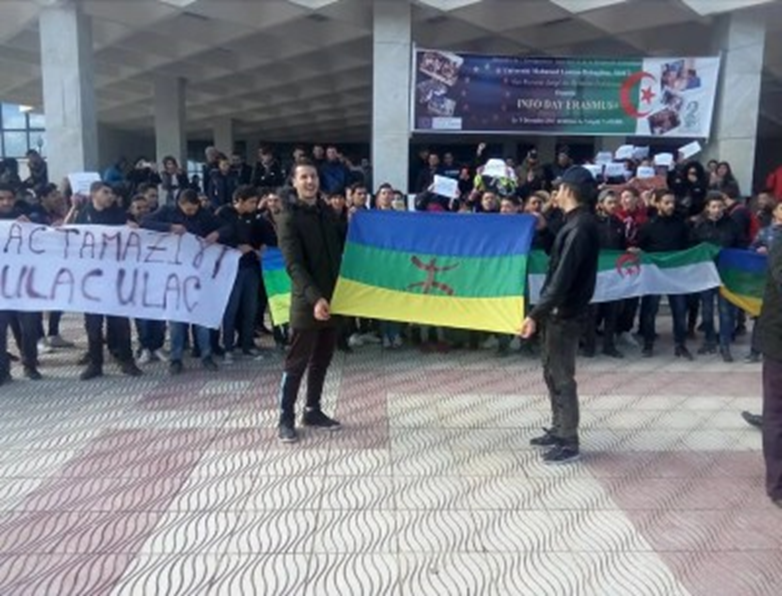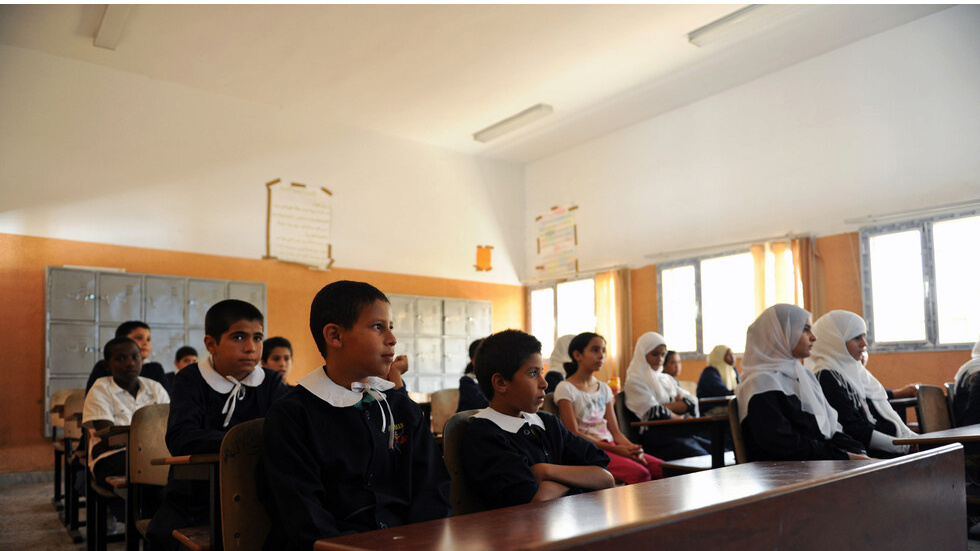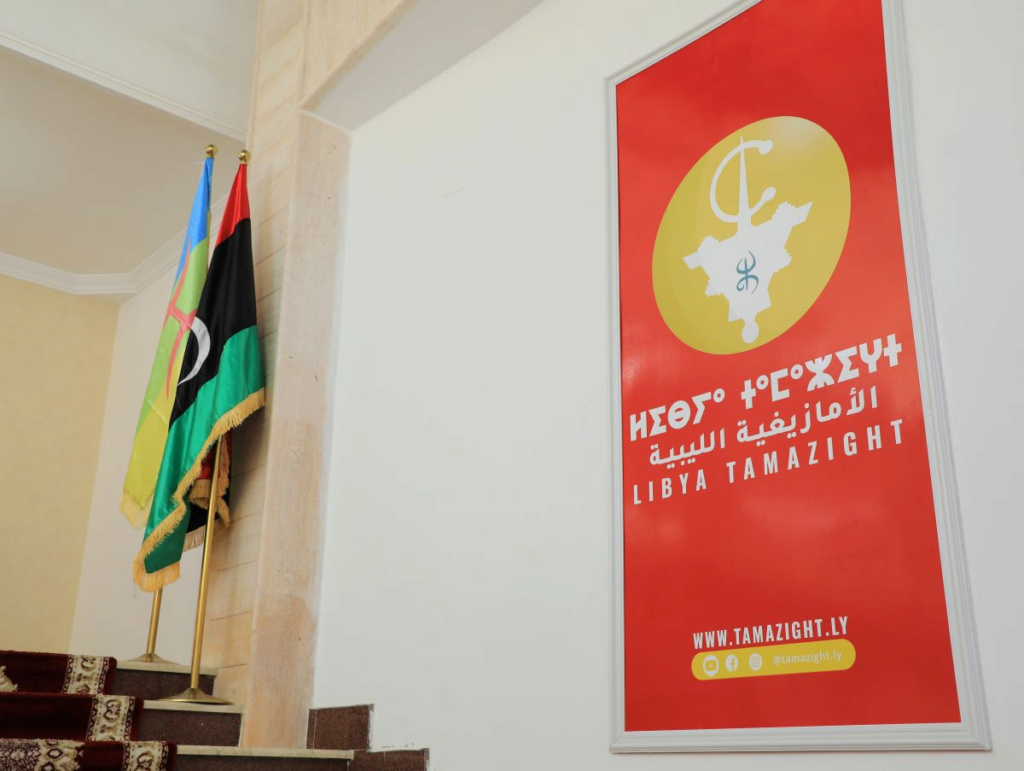Amazigh stations

The Amazigh issue went through multiple stages. In the beginning, it was a cultural issue revolving around the language, as Amazigh activists demanded that their language be rid of the marginalization and exclusion that had befallen it - in their view - in the face of the spread of the Arabic language since the advent of Islam until today. Then the demand developed into a political one adopted by associations and organizations.
These demands interacted during the last twenty years of the last century and expressed themselves in multiple geographical fields. They had a different appearance in Algeria than in Morocco, and they manifested themselves in Libya in a way different from what happened in Morocco and Algeria. The issue did not arise in either Tunisia or Mauritania, despite their entry into the Amazigh sphere for specific reasons.
The most prominent stages of the Amazigh issue in Algeria
Arabization
The declaration of former Algerian President Ahmed Ben Bella in a speech on July 5, 1962, that “Arabization is necessary because there is no socialism without Arabization and there is no future for this country without Arabization,” was considered the beginning of the interaction of the Amazigh issue in Algeria’s modern history.
The Socialist Forces Front party was established, headed by Hussein Ait Ahmed, on September 29, 1963. Since its establishment, the party has entered into an armed conflict with President Ben Bella.
Former Algerian President Houari Boumediene signed a decree on April 26, 1968, requiring all Algerian employees to have “sufficient knowledge of the national language (Arabic) when hiring them.”
Between 1974 and 1975, the Algerian authorities prohibited the naming of non- Arabic names.
On June 19, 1977, during a match in the presence of President Boumediene, supporters of the JS Kabylie team raised opposition slogans such as “The Amazigh language will live.” The incident led to the name of the JS Kabylie team being changed to the Electronic Tizi Ouzou team.

Amazigh spring
The events of what was known as the Amazigh Spring occurred in 1980 following Amazigh demonstrations against the Algerian government because it banned a lecture on ancient Amazigh poetry that Mouloud Mammeri intended to deliver at the University of Tizi Ouzou. A concert by the Amazighen Imola band was also cancelled.
Commemorating the murder of the Amazigh singer Matoub Lounes on July 9 of every year, who was killed in 1998.
Widespread protests and bloody confrontations broke out after the killing of the young man, Masinissa Korbah, on April 18, 2001, followed by waves of demonstrations and arrests.
Withdrawal of the Rally for Culture and Democracy in May 2001 from the government. This party and the Socialist Popular Front are described as having essentially Amazigh popular base.
Coordination of thrones
The Arous Coordination Organization was established in June 2001 and included the most prominent families in the Amazigh tribes and representatives of various Berber activities, especially civil society organizations.
In September 2001, Algerian President Abdelaziz Bouteflika called on the “Arouch Coordination” to submit a petition of demands. On October 3 of the same year, Prime Minister Ali Benflis called representatives of the “Throes” to confirm their approval of four out of 12 demands.

Recognition of the Amazigh language
The Amazigh language was officially recognized as a national language, without being equated with Arabic, in early 2002, at the initiative of President Bouteflika and with parliamentary approval.
State media have been providing detailed bulletins in Amazigh since 2002.
The most prominent stages of the Amazigh issue in Morocco

Recognition demands
King Hassan II, in his Throne Speech on August 20, 1994, called for “revitalizing the Amazigh language” by introducing it into education programs.
In March 2000, the head of the Moroccan Amazigh Culture Association, Mohamed Shafik, issued a statement calling for the official recognition of the Amazigh language, its inclusion in educational curricula, the allocation of time in the Moroccan media to introduce Amazigh culture, the lifting of the ban on registering births with Amazigh names, and the development of poor areas in which people live. Amazigh economically.
On April 17, 2000, Amazigh activists issued a statement in which they called on the Moroccan government to license the establishment of a special television station for the Amazighs of Morocco, recognize their cultural rights, allow their births to be registered in official records with Amazigh names, and restore respect for the Amazigh heritage in Morocco.
A peaceful march roamed the streets of Rabat on May 1, 2000 , demanding official recognition of the Amazigh identity and the teaching of the Amazigh language in schools. At the forefront of the demonstrators was the then president of the World Amazigh Congress, Rachid Rakha.
On May Day 2000, demonstrators - in addition to traditional demands - raised banners of solidarity with the Berbers of Algeria after the killing of the young man Korbah.

Institute of Amazigh Culture
The Royal Institute for Amazigh Culture was established in January 2002 to preserve the Amazigh heritage. King Mohammed VI emphasized at the opening of the institute that the Moroccan identity is multiple because it was built on several Amazigh, Arab, Saharan African and Andalusian tributaries.
In January 2003, King Mohammed VI recognized the Tifinagh letter as the official letter of Amazigh writing, in implementation of the recommendation of the Royal Institute of Amazigh Culture. The Amazigh language was officially recognized, many publications appeared in it, and it began to be taught in about 300 Moroccan primary schools in preparation for generalizing its teaching in all schools.

Amazigh and education
A symposium in Rabat in September 2003 called for expanding the teaching of Amazigh in all Moroccan schools, provided that this does not come at the expense of the political and cultural demands of the Amazigh.
An Amazigh conference was held in October 2003 under the slogan “For a unified Amazigh education.”
The most prominent stages of the Amazigh issue in Libya

Amazigh name ban law
The issuance of Law No. 24 of 2001 prohibiting the use of non-Arabic names in government records, and imposes a penalty on violators.
External opposition
On January 16, 2004, the Libyan opposition abroad organized a demonstration in which Amazigh activists participated and demanded an end to the political and cultural oppression of the Amazigh, the persecution of followers of the Ibadi sect, and to allow the establishment of Ibadi educational and religious institutions.
On September 24, 2004, the Libyan Amazigh Conference held an expanded meeting in London for three days. It recommended the continuation of the “Amazigh Right” campaign under the slogan “Do not kill my Amazigh name.”
On December 2, 2004, the conference also issued a statement in which it condemned the Libyan authorities’ preparation of blacklists that include Amazigh right activists inside and outside Libya and those demanding recognition of the Amazigh language, in order to incite their persecution internally and externally.
Recognizing the exclusion of the Amazigh

In September 2005, Saif al-Islam Gaddafi, the son of the Libyan leader, considered the Amazigh language to be part of Libyan culture, and during his visit to the Amazigh regions, he criticized Law No. 24, which prohibits the use of Amazigh names.
At the beginning of November 2005, Colonel Muammar Gaddafi received the President of the World Amazigh Congress, Dr. Belkacem Lounes, despite the fact that none of the Maghreb countries recognized the conference, which included Amazigh activists from Libya, Algeria, Morocco, Mali, and Niger.
Tunisians are trying to revive Amazigh culture without cramping.

Amazigh is an ancient and indigenous culture in Tunisia, but unlike other North African countries, especially Algeria and Morocco, this culture does not know much interest among Tunisians, as it has melted into other imported cultures such as Arabic and French, and it also prompted the political authority and with it the elite to later dissolve it into the fabric of one society. This has more disadvantages than advantages.
Shy and confused celebrations appeared in Tunisia to coincide with the advent of the Amazigh New Year. They were limited to some associations that have been officially active since the year 2011, in contrast to our regional neighbors, Algeria and Morocco, which devoted many cultural celebrations and seminars at the beginning of the year 2974 of the Amazigh Year.

The question that is posed here to Tunisian intellectuals, whether Arabs, Amazighs or others, is: How did 2,974 years of Amazigh presence not leave a mark befitting this ancient history, while seminars devoted to other cultural minorities that fall short of their demographic and historical size are widespread in the country, and multiply here and there? Who do we consider to be the indigenous people of the country?
Source : websites

